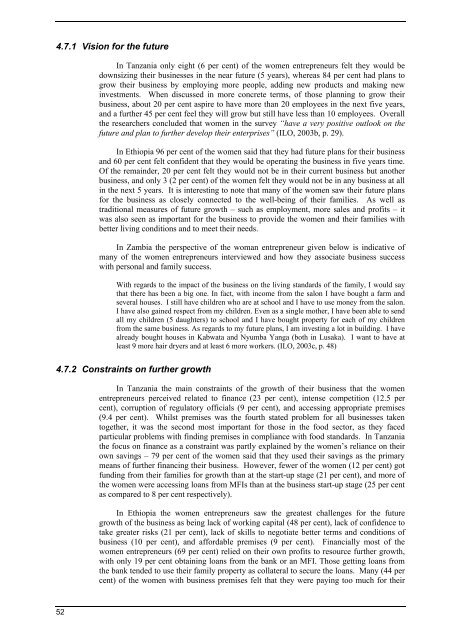The Challenges of Growing Small Businesses - International Labour ...
The Challenges of Growing Small Businesses - International Labour ...
The Challenges of Growing Small Businesses - International Labour ...
Create successful ePaper yourself
Turn your PDF publications into a flip-book with our unique Google optimized e-Paper software.
4.7.1 Vision for the future<br />
In Tanzania only eight (6 per cent) <strong>of</strong> the women entrepreneurs felt they would be<br />
downsizing their businesses in the near future (5 years), whereas 84 per cent had plans to<br />
grow their business by employing more people, adding new products and making new<br />
investments. When discussed in more concrete terms, <strong>of</strong> those planning to grow their<br />
business, about 20 per cent aspire to have more than 20 employees in the next five years,<br />
and a further 45 per cent feel they will grow but still have less than 10 employees. Overall<br />
the researchers concluded that women in the survey “have a very positive outlook on the<br />
future and plan to further develop their enterprises” (ILO, 2003b, p. 29).<br />
In Ethiopia 96 per cent <strong>of</strong> the women said that they had future plans for their business<br />
and 60 per cent felt confident that they would be operating the business in five years time.<br />
Of the remainder, 20 per cent felt they would not be in their current business but another<br />
business, and only 3 (2 per cent) <strong>of</strong> the women felt they would not be in any business at all<br />
in the next 5 years. It is interesting to note that many <strong>of</strong> the women saw their future plans<br />
for the business as closely connected to the well-being <strong>of</strong> their families. As well as<br />
traditional measures <strong>of</strong> future growth – such as employment, more sales and pr<strong>of</strong>its – it<br />
was also seen as important for the business to provide the women and their families with<br />
better living conditions and to meet their needs.<br />
In Zambia the perspective <strong>of</strong> the woman entrepreneur given below is indicative <strong>of</strong><br />
many <strong>of</strong> the women entrepreneurs interviewed and how they associate business success<br />
with personal and family success.<br />
With regards to the impact <strong>of</strong> the business on the living standards <strong>of</strong> the family, I would say<br />
that there has been a big one. In fact, with income from the salon I have bought a farm and<br />
several houses. I still have children who are at school and I have to use money from the salon.<br />
I have also gained respect from my children. Even as a single mother, I have been able to send<br />
all my children (5 daughters) to school and I have bought property for each <strong>of</strong> my children<br />
from the same business. As regards to my future plans, I am investing a lot in building. I have<br />
already bought houses in Kabwata and Nyumba Yanga (both in Lusaka). I want to have at<br />
least 9 more hair dryers and at least 6 more workers. (ILO, 2003c, p. 48)<br />
4.7.2 Constraints on further growth<br />
In Tanzania the main constraints <strong>of</strong> the growth <strong>of</strong> their business that the women<br />
entrepreneurs perceived related to finance (23 per cent), intense competition (12.5 per<br />
cent), corruption <strong>of</strong> regulatory <strong>of</strong>ficials (9 per cent), and accessing appropriate premises<br />
(9.4 per cent). Whilst premises was the fourth stated problem for all businesses taken<br />
together, it was the second most important for those in the food sector, as they faced<br />
particular problems with finding premises in compliance with food standards. In Tanzania<br />
the focus on finance as a constraint was partly explained by the women’s reliance on their<br />
own savings – 79 per cent <strong>of</strong> the women said that they used their savings as the primary<br />
means <strong>of</strong> further financing their business. However, fewer <strong>of</strong> the women (12 per cent) got<br />
funding from their families for growth than at the start-up stage (21 per cent), and more <strong>of</strong><br />
the women were accessing loans from MFIs than at the business start-up stage (25 per cent<br />
as compared to 8 per cent respectively).<br />
In Ethiopia the women entrepreneurs saw the greatest challenges for the future<br />
growth <strong>of</strong> the business as being lack <strong>of</strong> working capital (48 per cent), lack <strong>of</strong> confidence to<br />
take greater risks (21 per cent), lack <strong>of</strong> skills to negotiate better terms and conditions <strong>of</strong><br />
business (10 per cent), and affordable premises (9 per cent). Financially most <strong>of</strong> the<br />
women entrepreneurs (69 per cent) relied on their own pr<strong>of</strong>its to resource further growth,<br />
with only 19 per cent obtaining loans from the bank or an MFI. Those getting loans from<br />
the bank tended to use their family property as collateral to secure the loans. Many (44 per<br />
cent) <strong>of</strong> the women with business premises felt that they were paying too much for their<br />
52
















